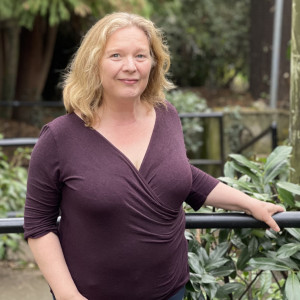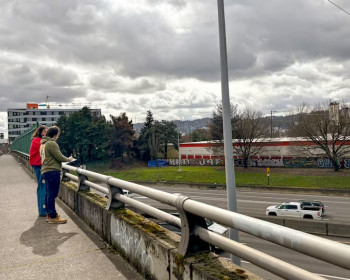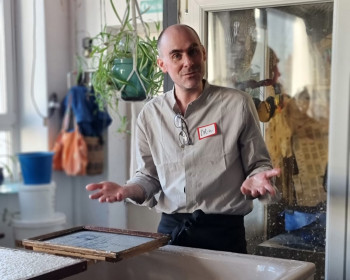Marjukka Barron
she/her
Marjukka Barron values the social justice lens that is front and center throughout the art therapy program.

“It felt like a bold move at the time, but over the course of my studies, I only became more committed to bringing the healing aspects of art to the many populations that can benefit from them.”
Barron knew she found the field that would empower her to best apply her skills, so she decided to return to school. Luckily, she found the art therapy program at Lewis & Clark, located in a city she dearly loves. She also greatly appreciated the social justice lens that is centered in all of L&C’s graduate school programs.
“Incorporating a social justice lens throughout the program has shaped my approach, heightening my attention toward using my privilege to advocate for the rights and needs of those who are disadvantaged and/or discriminated against. It has alerted me to examine my own assumptions and values, and those of oppressive systems, and to continue to educate myself in the many diverse cultures, beliefs, and values of the people we share the earth with.”
L&C’s cohort model has made it much easier for Barron to practice and voice differing ideas, concerns, and communication styles. She enjoyed her time with a small group of learners and has now formed meaningful bonds that will last for years to come.
Initially, Barron entered the program with a desire to work with children. However, through her primary internship site, she realized what a privilege and honor it is to work with older adults. She also plans to incorporate a social justice lens into her future career.
“It is essential to meet and engage people with openness and cultural humility, as well as awareness of one’s own assumptions. During my practicum and secondary internship I actively prioritized understanding the experiences, needs, and socio-cultural contexts of the refugee populations. I worked to effectively engage with and advocate for them. I will continue to do so, with whatever population I serve, in the hope to empower people who are vulnerable, marginalized, or underrepresented.”
Barron also reflected on the unique insights that she brought to the program as an immigrant to the United States. Her lived experiences from growing up in Finland allowed her to provide new and different perspectives to her peers about course topics. Additionally, she was also an older student than her peers.
“I have gone through the program with people who are a fair bit younger than I am. This has offered me new insights and perspectives, of which I have been appreciative, curious, and sometimes amazed. I imagine there have been similar exchanges both ways. Forming friendships over generational lines was something I hadn’t anticipated, and it has made my experience much richer. It has been wonderful to connect through our mutual endeavors, art and, often, humor.”
Barron offers this advice to prospective students: “Be prepared to be challenged. While being a student here means working hard, it is also a very enriching and fulfilling experience. Reach out to upper cohort students to help you with questions you may have, as well as faculty. There is support. Good luck!”

